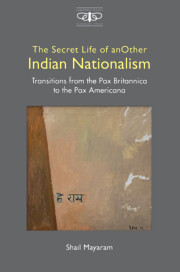 The Secret Life of AnOther Indian Nationalism
The Secret Life of AnOther Indian Nationalism Book contents
- Frontmatter
- Dedication
- Contents
- List of Figures
- List of Abbreviations
- Preface
- Acknowledgements
- Note on Transliteration
- 1 Introduction: Colonialism, Orientalism, Nationalism and the Shaping of Popular History and Religion
- 2 Orienting the Vernacular Imaginaire: James Tod and Indian Nationalism
- 3 War and Violence in Savarkar’s View of Indian History
- 4 Nationalism and Time: The Vishva Hindu Parishad’s Fantasmagorical History
- 5 Transforming Hinduism: The Politics of Vishva Hindu Parishad Conversion
- 6 AnOther History of Religion
- 7 Sushila Rawat, the Healer of Husain Tekri: Myth and Medical Pluralism as Resistance to Hindutva
- Index
6 - AnOther History of Religion
Published online by Cambridge University Press: 11 February 2022
- Frontmatter
- Dedication
- Contents
- List of Figures
- List of Abbreviations
- Preface
- Acknowledgements
- Note on Transliteration
- 1 Introduction: Colonialism, Orientalism, Nationalism and the Shaping of Popular History and Religion
- 2 Orienting the Vernacular Imaginaire: James Tod and Indian Nationalism
- 3 War and Violence in Savarkar’s View of Indian History
- 4 Nationalism and Time: The Vishva Hindu Parishad’s Fantasmagorical History
- 5 Transforming Hinduism: The Politics of Vishva Hindu Parishad Conversion
- 6 AnOther History of Religion
- 7 Sushila Rawat, the Healer of Husain Tekri: Myth and Medical Pluralism as Resistance to Hindutva
- Index
Summary
Consider what Ali Muhammad, a Merat, was told by an antagonist on 15 February 1996:
‘Let shoes fall on the namazis [persons who perform the canonical Islamic prayer], break the images of their deities.’
‘We were upset as these were made for our ancestors,’ he told me, and said that he had responded, ‘If you don't want to worship them, don't do so, but don't break them.’
He went on to describe the irony of the situation: while his uncle and half his family were held in police custody, he met the other half in Beawar, who wanted him to go with them to Chang, and further on to Nandna, with the devotional offering to the mother goddess shrine. ‘I said to myself,’ he said, ‘What a strange community, some are held up for breaking an image, some others are going to worship one!’
The icon-breaking episodes detailed in the previous chapter assumed that Muslims were responsible. Let us interrogate this assumption that came from the police administration, activists of religious nationalism and the anthropologist, that is, my own initial reaction, all of which came from our internalisation of the modern idea of Religion. Ali Muhammad's statement tells us of his bewilderment as some members of the family have been arrested for attacking gods, while some others are active followers of certain gods and goddesses. This is then the tension that is explored in these life histories—the introduction of the modern idea of religion as also what follows and what precedes it, not only temporally but as dissent. Mark the violence of Hindutva activists as they seek vengeance against members of their own community by attacking their ancestral deities which are, in effect, pagan practices from the standpoint of exclusive monotheism. The fraternal is not the site of either brotherhood or friendship but that of enmity.
This chapter is an ethnographic exploration of two interwoven strands, namely modernity and religion. It focuses on two interrelated fields, namely the work performed by the modern idea of religion and understandings of conversion. The two questions addressed are, What is the nature of religiosities before and after the advent of the modern idea of religion? What are perceptions and articulations of ‘conversion’?
- Type
- Chapter
- Information
- The Secret Life of AnOther Indian NationalismTransitions from the Pax Britannica to the Pax Americana, pp. 191 - 226Publisher: Cambridge University PressPrint publication year: 2022


